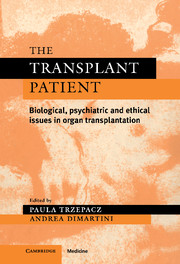Book contents
- Frontmatter
- Contents
- List of contributors
- Preface
- 1 The mystique of transplantation: biologic and psychiatric considerations
- 2 Psychosocial screening and selection of candidates for organ transplantation
- 3 Psychosocial issues in living organ donation
- 4 Quality of life in organ transplantation: effects on adult recipients and their families
- 5 Quality of life of geriatric patients following transplantation: short- and long-term outcomes
- 6 Cognitive assessment in organ transplantation
- 7 Pharmacologic issues in organ transplantation: psychopharmacology and neuropsychiatric medication side effects
- 8 Alcoholism and organ transplantation
- 9 Ethics and images in organ transplantation
- 10 Psychoneuroimmunology and organ transplantation: theory and practice
- 11 Pediatric transplantation
- 12 Current trends and new developments in transplantation
- Index
10 - Psychoneuroimmunology and organ transplantation: theory and practice
Published online by Cambridge University Press: 14 September 2009
- Frontmatter
- Contents
- List of contributors
- Preface
- 1 The mystique of transplantation: biologic and psychiatric considerations
- 2 Psychosocial screening and selection of candidates for organ transplantation
- 3 Psychosocial issues in living organ donation
- 4 Quality of life in organ transplantation: effects on adult recipients and their families
- 5 Quality of life of geriatric patients following transplantation: short- and long-term outcomes
- 6 Cognitive assessment in organ transplantation
- 7 Pharmacologic issues in organ transplantation: psychopharmacology and neuropsychiatric medication side effects
- 8 Alcoholism and organ transplantation
- 9 Ethics and images in organ transplantation
- 10 Psychoneuroimmunology and organ transplantation: theory and practice
- 11 Pediatric transplantation
- 12 Current trends and new developments in transplantation
- Index
Summary
Introduction
Psychoneuroimmunology (PNI) is the science of nervous, endocrine, and immune interactions in health and disease. Unfortunately, the field of PNI has been largely neglected by transplant biologists, who traditionally have been inclined to view the immune system as an autonomous network of host defense. However, the last decade has witnessed considerable progress in our understanding of the structural and functional pathways of neuroimmune interaction. In light of these advances, the role of PNI in organ transplantation warrants increased attention.
Transplantation is a viable clinical option for patients with a variety of end stage organ disorders. However, despite its overall success, this approach poses a variety of clinical challenges. Patients come to organ transplantation after a protracted illness, in which at least one vital organ has failed. As a rule they have previously been subjected to prolonged polypharmaceutical interventions. Anxiety and mood disorders are common, often reflecting either failed coping mechanisms including immunosuppresant mediator or the complications of metabolic encephalopathy. Frequent hospitalizations and invasive procedures also predispose these patients to developing phobias, panic disorder, and post-traumatic stress disorder (PTSD) (Surman 1989).
Successful integration of the transplanted organ is a psychosomatic challenge. From a psychodynamic perspective, the graft can be viewed as a liminal object, one that is foreign, yet also part of self. Castelnuovo-Tedesco (1981) has suggested that the graft is not psychologically inert and that mental factors can affect graft outcome.
- Type
- Chapter
- Information
- The Transplant PatientBiological, Psychiatric and Ethical Issues in Organ Transplantation, pp. 255 - 274Publisher: Cambridge University PressPrint publication year: 2000



